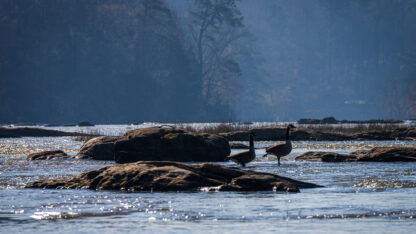Ga., Fla. Claim Groups Aren’t Cooperating In Water Wars
Florida and Georgia’s U.S. Supreme Court fight over water is hitting some obstacles. Georgia says the U.S. Department of Agriculture isn’t turning some documents over, and Florida says a group called the ACF Stakeholders is doing the same.
The case is, at its most basic, a dispute over whether Atlanta uses too much water – depriving Florida’s Apalachicola Bay of the water it needs to keep its oyster fishery healthy. Both states are gathering documents from business and environmental groups, scientists and agencies – adding up to hundreds of thousands of pages from anyone with information about the Chattahoochee, Flint and Apalachicola Rivers.
In their latest status updates, Georgia and Florida said they have run into issues with those two groups, out of all those they’ve requested information from.
“This is actually quite common,” said Ryan Rowberry, a professor at Georgia State University School of Law. He worked on this case on Florida’s side at a previous job, and he said it’s partially just an issue of scale. “With a water allocation between states, you’re going to need documents probably spanning 20, 30 years.”
On the states’ side, he said, it can be hard to figure out exactly what information to ask for. For the groups being subpoenaed, gathering decades’ worth of data can take time, and sometimes they don’t want the information they have to be made public.
That’s the issue with the ACF Stakeholders. It’s an independent group representing cities, companies and environmentalists from Georgia, Florida and Alabama that has proposed a way for the states to share water.
In order to get to that agreement, its members decided to keep some of the information they collected private so it couldn’t be misused, said Tim Thoms who sits on the ACFS governing board.
“You could make assumptions that weren’t accurate if you didn’t have the full set of the data or studies or the research as it was being presented,” said Thoms.
The group is discussing what to do about Florida’s subpoena, said Thoms, and it’s possible the governing board members could vote on turning over documents they’d agreed to keep private.
A spokesman for the USDA said he couldn’t comment, since this is pending litigation. The agency says it is processing the subpoenas.
All in all, Rowberry said this is a blip in a very long, expensive fight, but it may remind the states that settling outside of court could save everyone a lot of trouble.
“The amount of money that is going to be spent on document discovery is enormous, and the only people who probably stand to benefit from it are the attorneys,” he said. “It doesn’t make it rain, it doesn’t make more water flow between the borders. This is all simply a legal process which is extremely cumbersome.”
The Special Master, who oversees the administrative side of the case on behalf of the Supreme Court, has suggested many times that the states settle outside of court. And in the past few months, Gov. Nathan Deal and Florida Gov. Rick Scott have met to discuss the water wars.
9(MDAxODM0MDY4MDEyMTY4NDA3MzI3YjkzMw004))









